This is the Legend Of...
Everyone has a story to tell. Every story has the potential to become a legend. A story of ups and downs, highs and lows, triumphs and trials. Across all walks of life, across all professions, everyone has the potential to become a legend. But many of these stories are never told. The lessons and ideas learned from these life experiences are often never brought to the forefront of public attention. As a result, these lessons and ideas are often forgotten. How does one bring forward such lessons and ideas? How does one bring forth a true legend? Join Amos Vang, a Canadian lawyer, broadcaster, and podcaster, as he tells and features the untold real-life stories of professionals and people from all walks of life. From the sciences to the arts, from humanities to law, and from everything in between, Amos features the fascinating stories of how experts, leaders, and hard-working professionals have excelled in their individual careers and life pursuits, and Amos highlights the important lessons that everyone can learn from, no matter the age. Real-life stories, timeless lessons, rising legends. Find them all here on ”This is the Legend Of...”.
Episodes
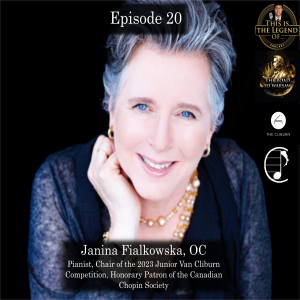
4 days ago
4 days ago
If you are a classical pianist, classical musician, or classical music fan, then you know who she is.
The late great Arthur Rubinstein described her as a “born Chopin interpreter”. In fact, Arthur Rubinstein was her mentor.
She is described as “one of the Grandes Dames of piano playing”. She is also a Juno Award winner.
She is an alumna of The Juilliard School.
She was the student of Yvonne Hubert, Yvonne Lefebure, and Sascha Gorodnitzki, and she has mastered the French Cortot and the Gorodnitzki piano performance techniques.
She won third prize at the 1974 Arthur Rubinstein International Piano Competition.
She is an Officer of the Order of Canada.
She was the Chair of the jury for the 2023 Junior Van Cliburn International Piano Competition (aka the U.S. Open of piano).
Later in 2025, she will be a jury member of the Honens International Piano Competition in Canada.
This is the Legend Of Janina Fialkowska.
In this episode, Amos Vang and Janina Fialkowska discuss the evolution of Janina’s pianistic performance, the Gorodnitzki technique, her experiences at the Arthur Rubinstein International Competition, the importance of Arthur Rubinstein’s mentorship, and the importance of musicality in pianism. As a foundational component of The Road to Warsaw, Janina’s contributions to the performance of Chopin have pioneered and inspired many generations of pianists around the world.
You can follow Janina on her website: https://www.fialkowska.com/
Tomorrow by Scott Buckley – released under CC-BY 4.0. www.scottbuckley.com.au
Other music composed by: Amos Vang and Fryderyk Chopin
-- CHAPTERS --
0:00 – Introduction
3:08 – Janina Fialkowska’s first musical inspirations
4:36 – Yvonne Hubert, Janina Fialkowska’s 2nd piano teacher
6:51 – The influence of Bach is profound in classical and jazz piano performance. I.e. Oscar Peterson.
8:06 – Yvonne Lefebure, Janina Fialkowska’s 3rd piano teacher
8:34 – A pianist must be careful to prevent theatrics from distracting the audience from the actual musical performance.
9:58 – What was the Juilliard application process like, for Janina Fialkowska?
13:00 – How influential was Sascha Gorodnitzki to Janina Fialkowska’s style?
16:03 – What is the Gorodnitzki piano technique?
18:01 – What were the greatest challenges that Janina Fialkowska faced at Juilliard? How did she overcome these challenges?
20:41 – Many pianists, and by extension other classical musicians, are introverts.
23:02 – Introverts like Amos and Janina are very comfortable with their own company and with being alone.
25:58 – Janina Fialkowska ALMOST WENT TO LAW SCHOOL! INSTEAD, SHE COMPETED AT THE 1974 ARTHUR RUBINSTEIN INTERNATIONAL COMPETITION!
28:56 – This is Janina Fialkowska’s journey to the 1974 Arthur Rubinstein International Competition.
35:29 – Liszt Piano Sonata and Chopin’s Concerto in E minor are LEGENDARY pieces of music.
38:53 – Fun fact: Chopin’s Concerto in E minor is featured in “The Truman Show” (1998), starring Jim Carrey.
39:22 – Arthur Rubinstein was Janina Fialkowska’s mentor. What was it like to study with Arthur Rubinstein?
42:35 – Arthur Rubinstein never practiced! He even stopped Janina Fialkowska from practicing!
43:31 – Arthur Rubinstein and Janina Fialkowska had a fantastic mentor-mentee relationship.
45:29 – What is musicality to Janina Fialkowska?
49:58 – Yunchan Lim, Bruce Liu, the Cliburn Competition, and the Chopin Competition
53:09 – Janina Fialkowska believes that Canada is #1 in the world for piano!
57:21 – To ethnic Chinese people such as Amos Vang, piano is their hockey
58:47 – Playing piano is beneficial for the brain
59:23 – Practicing at the Cliburn Competition and for any other music competition is basically training for an athletic competition for some (NOT all) pianists.
1:02:23 – Who is Fryderyk Chopin to Janina Fialkowska?
1:05:09 – The polonaise is an official item of the UNESCO Intangible Cultural Heritage Lists.
1:06:50 – Why are the Chopin Competition and the Cliburn Competition so revered among the general public?
1:10:30 – How does Janina Fialkowska express bel canto in her performance?
1:15:47 – In piano competitions, some pianists crash and burn at the finals because they don’t have experience performing with orchestras.
1:16:38 – Polish National Edition vs. Paderewski Edition. Can there be a genuine Urtext for Chopin?
1:19:52 – What are the common misconceptions that Janina Fialkowska has seen?
1:20:54 – Despite the achievements of Canadian pianists, the average Canadian is not musically literate. Here’s why.
1:23:18 – Sports and music have a lot in common. Can this commonality be a solution to improving classical music appreciation?
1:26:34 – What are the most important lessons that Janina Fialkowska has learned in her career?
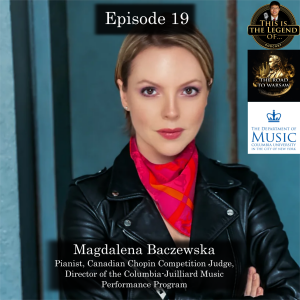
Sunday May 04, 2025
Sunday May 04, 2025
"Columbia University professor by day, musical sorceress by night"! - ConcertoNet
Meet Magdalena Baczewska, a Polish virtuoso pianist, Director of the joint Columbia-Juilliard Music Performance Program, and judge of the 2025 Canadian Chopin Competition! Born in Katowice, Poland, Magdalena grew up with a deep passion for piano performance from a young age. Throughout her entire career, she has performed with the world's most renowned orchestras such as the San Francisco Symphony Orchestra, the Philadelphia Orchestra, and the China National Symphony. Through her legendary experiences, Magdalena has become an important checkpoint on The Road to Warsaw.
Join Amos Vang as he and Magdalena discuss a plethora of topics, such Magdalena's career, the importance of musicality, the profound effect of Fryderyk Chopin's music on the world, and the importance of the Canadian Chopin Competition and the International Chopin Competition.
You can follow Magdalena on Instagram: @maguchannyc
Tomorrow by Scott Buckley – released under CC-BY 4.0. www.scottbuckley.com.au
Other music composed by: Amos Vang and Fryderyk Chopin
-- CHAPTERS --
0:00 – Introduction
3:01 – Reminiscing on the Canadian Chopin Competition
3:47 – What inspired Magdalena Baczewska to learn piano?
8:23 – A pianist can deeply learn music just by listening to it. It then comes out later when that pianist learns the piece seriously.
10:15 – What were Magdalena Baczewska’s musical influences?
11:30 – Most Canadians and Americans do NOT focus on the development of classical music appreciation at a young age.
14:11 – To ethnic Chinese people such as Amos Vang, piano is their hockey! Piano is their pastime!
16:47 – 40 million Chinese children learn piano on any given day. That’s approximately the entire population of Canada or Poland!
18:21 – Skip 1 day of practice = you notice it. Skip 2 days of practice = your friends notice it. Skip 3 days of practice = EVERYONE notices it!
18:37 – Music enforces structure, order, and discipline.
19:02 – In Ontario, music education is in crisis. Here’s why.
20:21 – In the U.S., funding for libraries, culture, and the arts are usually the first things that gets cut in an economic crisis.
21:51 – People were fascinated by the talent and skill shown at the 2025 Canadian Chopin Competition!
24:06 – Sports and music competitions have A LOT in common. This is how Amos Vang connects these two worlds together.
25:21 – The Canadian Chopin Competition sounded like the Olympics, according to Magdalena Baczewska!
26:47 – As both a pianist and a sports announcer, Amos Vang sees direct parallels between sports and music.
27:51 – The MVPs of the Canadian Chopin Competition’s existence is Dr. Janet Lopinski, Konrad Swierczek, and the rest of the Organising Committee and the Canadian Chopin Competition!
30:27 – How has Magdalena Baczewska’s musical style evolved?
35:11 – Bel canto singing in piano performance
35:55 – Yunchan Lim made history by being one of the few pianists in history by performing all of Liszt’s Transcendental Etudes in one sitting!
37:19 – Wilde Jagd = the Wild Chase.
39:01 – Ivo Pogorelic vs. Yunchan Lim in their performances of the Wilde Jagd. Pogorelic is SCARY!!!!!
40:37 – Chopin’s Polonaise in A Flat Major Op. 61 has A RICH MUSICALITY BASE.
44:52 – What are Magdalena Baczewska’s tasks as the Director of the Columbia-Juilliard Music Performance Program?
49:59 – Non-musical perspectives can greatly influence a musician’s musicality
53:09 – Justice Rosalie Abella was a classical pianist. You can see her pianism in her judgment writing.
55:03 – What is musicality to Magdalena Baczewska?
58:24 – Music is not just playing random notes, just as how in hockey, a team does not just randomly shoot on goal. There’s a strategy and plan that goes into both musical performance and athletic performance.
1:02:05 – Why is Fryderyk Chopin’s music so profound to people around the world?
1:05:10 – Who is Fryderyk Chopin to Magdalena Baczewska?
1:10:57 – Musicians have the ability to express, understand, and appreciate the emotional spectrum because of their musical training.
1:12:42 – Can Chopin’s music be an effective coping mechanism for the world’s loneliness epidemic?
1:14:18 – Chopin’s music can evoke strong emotional responses in audiences, musicians or otherwise!
1:18:49 – Music = expression of humanity.
1:23:15 – Many people have NOT had the opportunity to explore the emotional spectrum to the extent that classical music explores it.
1:25:07 – Chopin has mastered the composition of the polonaise!
1:25:53 – “Pan Tadeusz” features a modern polonaise!
1:26:50 – Poland was wiped off the map until 1918. This was why Chopin was so passionate about his Polish side.
1:28:44 – What are the most important lessons and rewarding things that Magdalena Baczewska has learned and experienced in her career?
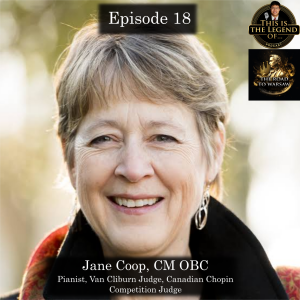
Saturday Mar 29, 2025
Saturday Mar 29, 2025
At 19 years old, she won the CBC National Radio Competition.
She has performed at the world’s most renowned concert halls, such as Carnegie Hall, Wigmore Hall, and the Bolshoi.
She is a member of the Order of Canada and the Order of British Columbia.
She is a 3-time Juno Award nominee.
She is a jury member of the Canadian Chopin Competition and the Junior Van Cliburn International Competition (for context, if the International Chopin Competition in Warsaw is Wimbledon/the Olympics, then the Van Cliburn is the U.S. Open).
She is a crucial checkpoint on the Road to Warsaw.
Join Amos Vang as he features the virtuosic career of pianist Jane Coop, CM OBC. In this episode, Jane and Amos discuss the sheer amount of practice and skill required to even compete at the national and international levels of classical piano performance (6 to 9 hours a day, for pianists as young as 9 years old!), the beauty of Fryderyk Chopin’s music, and the difficult job that Jane has as a judge of the world’s top piano competitions. Jane and Amos also discuss their own respective connections to piano performance, the importance of meditating on musical repertoire, and musicality itself.
Tomorrow by Scott Buckley – released under CC-BY 4.0. www.scottbuckley.com.au
Other music composed by: Amos Vang and Fryderyk Chopin
-- CHAPTERS --
0:00 – Introduction
3:08 – Reminiscing on the Sixth Canadian Chopin Competition
3:42 – What inspired Jane Coop to pursue piano?
5:24 – What were Jane Coop’s early music influences?
9:25 – At 19, Jane Coop won 1st prize at the CBC National Radio Competition. What was it like for her to win that prize?
11:00 – What is it like to perform at Carnegie Hall, Wigmore Hall, and the Bolshoi?
12:15 – Most classical music listeners do NOT focus on the celebrity. Rather, they focus on the performance’s quality itself.
16:20 – More Canadians and Americans are appreciating classical music, especially Chopin!
17:47 – How does Jane Coop judge the Cliburn, the Honens, and the Canadian Chopin Competition?
20:25 – Young Chinese pianists practice A LOT – 6 hours a day! Even then, it’s NOT ENOUGH!
23:36 – Choosing the top 3 of the Canadian Chopin Competition was extremely difficult!
24:22 – The final round of the 2025 International Chopin Competition has a new requirement: play the Polonaise-Fantasie in A flat Major Op. 61 along with one of Chopin’s concerti!
24:46 – Chopin’s Polonaise-Fantasie in A flat Major Op. 61 says a lot more musically than his concerti!
28:16 – What is musicality to Jane Coop?
30:41 – Modern grand pianos (especially modern concert grand pianos) are VERY different from Chopin’s Pleyel pianos.
32:41 – Who is Fryderyk Franciszek Chopin to Jane Coop?
36:08 – The Chopin Competition = Wimbledon, and the Van Cliburn = U.S. Open!
37:55 – The jury of the International Chopin Competition has an EXTREMELY DIFFICULT JOB!
39:00 – Jane Coop owns a Hamburg Steinway piano. What is the difference between a New York Steinway and a Hamburg Steinway?
40:20 – At the 2021 International Chopin Competition, each competitor only had 15 minutes to try out all 5 pianos.
42:37 – In what ways has Chopin surprised Jane Coop?
45:37 – Will it ever be possible to have a true Urtext for Chopin?
49:15 – How does Jane Coop practice piano?
52:08 – The finest instrument is the mind!
54:48 – How does Jane Coop balance her musical philosophy and Chopin’s musical philosophy in her performances?
58:53 – How has Jane Coop’s music style evolved over her entire performing career?
1:00:46 – In musical performance, show, don’t tell!
1:01:43 – How does Jane Coop cooperate with different music ensembles in performance?
1:07:14 – How to watch or listen to the International Chopin Competition?
1:11:57 – Canada has a misconception of classical music as an elitist genre.
1:21:52 – What are the most rewarding aspects of Jane Coop’s career? What are the most important lessons that Jane Coop has learned?
1:26:42 – Like, Subscribe to the YouTube channel, click the bell notification icon, and follow the podcast!
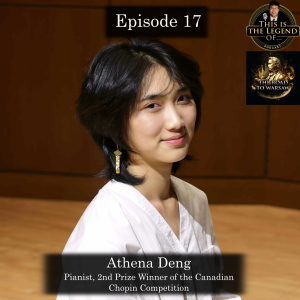
Saturday Mar 01, 2025
Saturday Mar 01, 2025
At 11 years old, she performed her first major performance with an orchestra.
At 12 years old, she won her first international competition.
At 22 years old, she won 2nd prize at the Canadian Chopin Competition.
And later this year in 2025, Athena Deng will be competing for the greatest piano prize of all at the International Chopin Competition.
Join Amos Vang on the first miniseries episode of “The Road to Warsaw” as he features the legend of Athena Deng. Amos and Athena discuss in great detail Athena’s career, achievements and experiences (including those at the 2025 Canadian Chopin Competition), as well as the intricacies of musicality and excellent piano performance. Amos and Athena also discuss the legacy of Fryderyk Franciszek Chopin and the impact of Chopin’s music on the world, along with the importance of the International Chopin Competition.
-- CHAPTERS --0:00 – Introduction3:03 – What inspired Athena Deng to pursue piano?4:10 – Piano is the hockey equivalent for ethnic Chinese people like Amos Vang and Athena Deng5:48 – What were the early influences on Athena Deng’s style?7:15 – Athena Deng is a major fan of the great Martha Argerich!8:07 – What were Athena Deng’s favorite memories with her early years as a young pianist?9:18 – Athena Deng explains the ideal hand position for playing piano.10:44 – What were the greatest challenges that Athena Deng faced early on?14:35 – Similar to sports such as hockey, rewatching one’s own piano performances is highly important for pianists to fix their flaws.17:07 – At 11 years old, Athena Deng made her major orchestral performing debut.21:17 – Martha Argerich’s performance of Prokofiev’s Piano Concerto No. 3 influenced Athena Deng’s performance.22:24 – Athena Deng also performed Prokofiev’s Toccata. Amos Vang explains the difficulty of that piece.23:29 – What were the most important lessons that Athena Deng learned from her debut?25:00 – Athena’s sister, Corina Deng, is a violinist. Athena explains her experiences with performing with Corina. 27:00 – At 12 years old, Athena Deng won her first international competition. How does she prepare for these competitions?31:21 – Amos Vang shares his experiences with preparing for the Canadian Music Competition.33:31 – How do pianists such as Athena Deng and Amos Vang adapt to different pianos?37:48 – What does Athena Deng look for in a piano?39:35 – What was it like to study with Dang Thai Son?41:29 – Dang Thai Son faced a lot of tribulation42:53 – Athena Deng’s performance of Chopin’s “Funeral March”46:11 – What sparked Athena Deng to embark on the Road to Warsaw?50:17 – What was Athena Deng’s feelings during each round of the Canadian Chopin Competition?53:20 – Athena Deng describes the experience of winning 2nd prize at the Canadian Chopin Competition54:13 – What is Athena Deng’s mindset going into the International Chopin Competition?57:00 – Considering Chopin’s letters in musical performance59:35 – Krzysztof Jablonski1:01:45 – Paderewski edition vs. Ekier edition/Polish National Edition. Which one is the most accurate and faithful to Chopin?1:02:50 – Who is Chopin to Athena Deng?1:06:32 – What is musicality to Athena Deng?1:07:31 – Why is Chopin’s music so profound and impactful to people?1:10:29 – Practice is important!1:14:56 – How to do bel canto singing while playing Chopin’s music?1:18:10 – Alexander Gadjiev took up timpani to polish his piano performing technique!1:23:12 – Athena Deng played on period instruments! How did they sound, and how are they different from modern pianos?1:24:57 – People’s sense of hearing has diminished in the 21st century.1:32:55 – How does Athena Deng balance her musical philosophy with Chopin’s philosophy?1:35:15 – Piano performance is like method acting. Amos Vang uses the example of Martin Scorsese.1:38:35 – What are the worst misconceptions about classical music?1:49:10 – What are the most rewarding aspects of Athena Deng’s career?1:52:28 – Outro
You can follow Athena on Instagram: https://www.instagram.com/athenadenq/
MUSIC BY: Scott Buckley - Tomorrow – released under CC-BY 4.0. https://www.scottbuckley.com.au/
And by: Amos VangAnd by: Fryderyk Franciszek Chopin
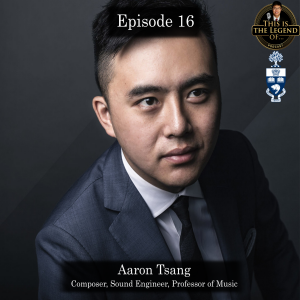
Friday Jan 31, 2025
Friday Jan 31, 2025
An excellent composer must have exceptional understanding of the audience’s preferences.
In part 2 of the Legend of Aaron Tsang, Amos Vang and Aaron Tsang discuss Aaron’s decision to go to the University of Toronto for music composition, the evolution of Aaron’s musical style, the similarities between composers and lawyers, and the importance of mentorship in the music profession and the legal profession.
You may also be surprised at the number of similarities between composers and lawyers.
Aaron also discusses the importance of predicting and understanding an audience’s musical tastes, and Amos and Aaron discuss concrete examples such as Mick Gordon’s “Doom: 2016” and “Doom Eternal” soundtracks, as well as Christopher Tin’s “Baba Yetu” and “Sogno di Volare” for Civilization IV and VI respectively.
Intro and Outro music: Jubilant Dawn (University of Toronto Graduation Fanfare), MIDI version, by Aaron Tsang
Any other referenced music belongs to their respective owners.
--- CHAPTERS ---
0:00 – Recap and Introduction
0:41 – This is why the University of Toronto’s Music program is a top choice for music training.
5:13 – Musical style is defined by the rhythm.
7:39 – Mychael Danna, the Oscar Award-winning and Golden Globe Award-winning composer for the film “Life of Pi”, is an alumnus of the University of Toronto’s Music Composition Program!!!!!
8:07 – Christopher Tin’s Grammy Award-winning “Baba Yetu” is legendary. Here is why.
9:24 – Christopher Tin displays a mastery of different languages in his compositions.
10:26 – How has Aaron’s musical style evolved over his career?
12:04 – Aaron had to build his entire computer setup to create his own music.
12:46 – One must be sensitive and capacious to areas of knowledge that are entirely foreign to one’s own knowledge base.
16:47 – Proper musical recording technique can even lead to a Juno Award win!!!!!
19:15 – Just like musicians, experienced lawyers can find themselves struggling to explain legal concepts to junior lawyers.
19:52 – Law school does NOT teach you how to practice law. Rather, it only teaches you how to think like a lawyer (and even then, it is not very good at doing that).
21:07 – Mentors are EXTREMELY IMPORTANT in the legal profession.
23:44 – A composer can learn A LOT about unfamiliar instrumentation through trial and error.
25:25– Law school does one thing well: the work is voluminous. There is A LOT of work in law school. Legal writing is an important skill!!!!!
27:38 – Talking to clients (as a lawyer) is a difficult skill. Explaining difficult legal concepts to clients in plain English is important.
28:55 – Anything that is compelling will translate well across the board. This is true in music, law, and most other industries.
31:38 – Composers, lawyers, and sports broadcasters make their jobs look easy. This can be a blessing and a curse.
32:32 – Mick Gordon had an extremely tight timeline to compose the soundtracks for the “Doom” series.
33:08 – The OSTs for the Doom series display Mick Gordon’s musical compositional prowess.
34:40 – Good music composition is not easy.
36:25 – An excellent composer can understand the listener and can imply the listener’s expectations.
41:20 – Composers and lawyers have one common question to answer: who is the audience of their written work?
43:00 – Martha Argerich is one of the greatest pianists of all time. Here’s why.
48:40 – Back in Amos’s piano performing days, Amos also experienced a similar form of quick, instinctual learning to the type that other performing pianists have.
50:05 – Amos applies his musical training in his sports announcing. Here’s how.
55:48 – What are the similarities and differences between Aaron’s approach to film music composing and to video game music composing?
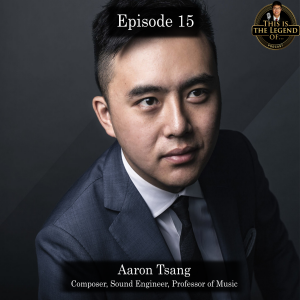
Friday Dec 27, 2024
Friday Dec 27, 2024
At 14 years old, his music and films were featured at international film festivals.
He’s composed for world-renowned video game and entertainment publishers such as Capcom, DreamWorks Pictures, and Konami.
In fact, the intro and outro music that you will hear on this episode was written by Aaron Tsang, specifically for all graduation ceremonies at the University of Toronto.
This is the Legend Of… Aaron Tsang, award-winning composer and music professor at the University of Toronto!
Join Amos Vang and Aaron Tsang in their discussion on Aaron’s career, musical style, musical influences, and musical analysis.
This is the first part of a multi-part conversation, so stay tuned for future parts. On this part, Amos and Aaron discuss:
Aaron’s early musical influences and beginnings
Aaron’s experiences as a young teenager making music and films at international film festivals
The question of whether music can truly be objective
Musical analysis on iconic themes such as the Super Smash Bros. Melee Menu 1 Theme, and why they hit so differently
The influence of the famous Chinese story, “Journey to the West”, and other wuxia stories on Aaron’s musical style
You can follow Aaron on Instagram: @aarontsang.music
You can visit Aaron’s website: www.aarontsang.com
-- CHAPTERS –
0:00 – Introduction
2:36 – What inspired Aaron Tsang to pursue music?
4:50 – What instruments did Aaron play?
6:53 – How do pianists apply bel canto singing to piano performance?
7:44 – How did these instruments influence Aaron’s musical thinking?
8:57 – How do pianists perform within the gaps of the notes?
11:34 – The same pianist can perform the same piece of music differently across different concerts. How?
13:00 – Tempo rubato in classical music
17:33 – Public advocacy as a lawyer is very similar to musical performance as a pianist. How?
19:34 – Public advocacy, musical performance, and sports announcing have A LOT in common. How?
20:03 – Aaron’s early non-musical influences on his musical style
23:07 – Video games REALLY influenced Aaron’s musical style. Why?
25:20 – Wuxia REALLY influenced Aaron’s musical style. Why?
28:09 – Journey to the West is one of the most influential stories in the world (probably even more than Shakespearean stories)
28:54 – Black Myth Wukong reused a part of the main theme from the 1986 TV adaptation of Journey to the West!
29:47 – Westerners, especially Canadians and Americans, are rediscovering the beauty of wuxia films such as “Hero” (2001)!
31:04 – Super Smash Bros. Melee’s menu theme is ICONIC!!!!!
31:57 – In his professorship, Aaron argues that music is not subjective. How?
33:04 – Why is Super Smash Bros. Melee’s menu theme so iconic? Here’s Aaron and Amos’s musical analysis and discussion on that.
40:40 – Melee’s Opening Theme is ALSO ICONIC. Here’s why.
42:57 – Nintendo is the master of nostalgia, especially when it comes to musical composition and counterpoint.
45:08 – At 14 years old, Aaron’s work was featured at international film festivals. This is how he storyboards his music and films.
52:03 – Effective communication between the composer and the producer is important.
57:21 – Similar to music, effective communication between a lawyer and a client is important.
1:02:19 – Outro. Stay tuned for the next part!!!!!
Intro and Outro Music by: Aaron Tsang
All other referenced music featured in this episode are attributed to their respective composers.
Website: https://www.thisisthelegendof.com/
LinkedIn: https://www.linkedin.com/company/this-is-the-legend-of/
Instagram: https://www.instagram.com/thisisthelegendof/
YouTube: https://www.youtube.com/@ThisistheLegendOf
Spotify: https://open.spotify.com/show/4f6wBCVf4bHOkf6Gxb4kb7
Amazon: https://www.audible.ca/pd/B0CHXVZDSY?qid=1694649289&sr=1-1&ref_pageloadid=yW4V4kLXM2THpddw&ref=a_search_c3_lProduct_1_1&pf_rd_p=b278ed0a-c3b2-4491-808c-7cb2190a487c&pf_rd_r=4DEBBGB872W8C893VWEB&pageLoadId=IMnSONEv6qRwv8k9&creativeId=0d6f6720-f41c-457e-a42b-8c8dceb62f2c
IHeartRadio: https://www.iheart.com/podcast/269-this-is-the-legend-of-123106291/
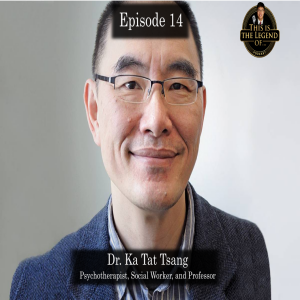
Friday Nov 29, 2024
Friday Nov 29, 2024
Gone are the days when people had one job.
Gone are the days when professions such as lawyers and doctors enjoyed a high level of respect and recognition.
Gone are the days when it was believed that a person could only be an expert in one area.
Today, it is becoming increasingly important to have expertise in not just one profession, but MANY professions. Ironically, this is a return to the Renaissance’s idea of multifaceted expertise.
All of this is thanks to post-professionalism, which is the largestsocial shift since industrialization and arguably since the Western world’s Enlightenment.
Dr. Ka Tat Tsang, psychotherapist, social work expert, and inventor of the iconic Strategies and Skills and Learning Development (SSLD) system, returns to This is the Legend Of… to discuss the legend of post-professionalism and the ways in which it has affected the world. In this episode, Dr. Tsang and Amos Vang discuss the following topics:
0:00 – Introduction
0:42 – What is post-professionalism?
2:00 – How did we get to post-professionalism?
3:27 – 1945 vs. 1960 vs. 2024 in post-secondary education levels
5:22 – Post-professionalism was sorta inevitable, because of the mass professionalization of everyone
6:05 – Today, lawyers and doctors no longer enjoy the same degree of respect compared to decades ago
7:55 – Attitudes towards the legal profession have substantially changed
9:55 – Certain parts of the legal practice have lost some of its meaningful/fulfilling aspects
12:55 – Mental illnesses resulting from professional life, including the legal and medical professions
13:55 – Institutional control and surveillance
14:21 – Dunbar’s Number and the erosion of trust between people
17:55 – Today, people struggle to build meaningful connections with each other, unlike 150 years ago
19:05 – Chinese cultural concept of “guan xi” (關係)
19:54 – The relationship between therapist and client is MORE IMPORTANT than the method!
20:10 – Why therapy FAILS Asian-Americans and Asians
22:10 – Strong relationships are important in ANY profession
22:37 – Cheap oil and cheap energy may have significantly harmed human relationships
26:00 – The future may be a return to the small rural communities, NOT technology: Amos’s argument at Stanford University’s MAHB
27:00 – The individual vs. the tribe
30:25 – The professional paradigm is NOT SUSTAINABLE ANYMORE!
31:15 – All high-income countries in the West and in Asia have extremely low fertility rates that are below the replacement rate
32:00 – University professorship opportunities are decreasing, too
32:30 – The market must be reformulated into a post-professional model
33:56 – Sustainability vs. growth
40:30 – How can you adapt to the post-professional world?
43:05 – Humans face challenges that require expertise in more than one profession
44:00 – The labour market has shifted towards a post-professional, multidisciplinary world
45:05 – AI and the post-professional world
49:00 – Amos’s post-professional career – music and sports have A LOT in common
50:03 – Amos’s post-professional project – can string theory, metaphysics, and epistemology answer the Questions of Infinity and Impossibility?
54:50 – Professionals such as lawyers and doctors were expected to follow certain social scripts. Not anymore today.
55:25 – People are freer to move around in the post-professional world
1:02:04 – What does it mean to be human?
1:05:12 – Concluding Remarks
You can subscribe to Dr. Tsang’s YouTube channel: https://www.youtube.com/@tsangkatat
Music by: Amos Vang
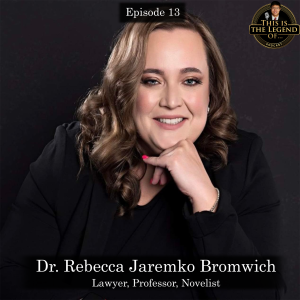
Friday Oct 25, 2024
Friday Oct 25, 2024
Lawyer. Professor. Contestant on CBC’s “Canada’s Smartest Person”. Former election candidate for Ottawa City Council and for the Law Society of Ontario. Legal polymath. This is the Legend Of… Rebecca Jaremko Bromwich.
Join Amos Vang as he features the trailblazing career of Dr. Bromwich. The two lawyers discuss the inspiration for Dr. Bromwich’s versatile, diverse career across the law and non-law worlds, as well as the most important lessons that Dr. Bromwich learned over the years.
Professor Bromwich will also be a regular guest on "This is the Legend Of..."!
Amos and Dr. Bromwich also discuss other topics, such as the importance of genuine cultural humility, the limits of Canadian cultural thinking, nihilism vs. absurdism vs. existentialism, and other esoteric philosophical discussions.
Music by: Scott Buckley
https://www.scottbuckley.com.au/
And by: Amos Vang
Website: https://www.thisisthelegendof.com/
LinkedIn: https://www.linkedin.com/company/this-is-the-legend-of/
Instagram: https://www.instagram.com/thisisthelegendof/
YouTube: https://www.youtube.com/@ThisistheLegendOf
Spotify: https://open.spotify.com/show/4f6wBCVf4bHOkf6Gxb4kb7
Amazon: https://www.audible.ca/pd/B0CHXVZDSY?qid=1694649289&sr=1-1&ref_pageloadid=yW4V4kLXM2THpddw&ref=a_search_c3_lProduct_1_1&pf_rd_p=b278ed0a-c3b2-4491-808c-7cb2190a487c&pf_rd_r=4DEBBGB872W8C893VWEB&pageLoadId=IMnSONEv6qRwv8k9&creativeId=0d6f6720-f41c-457e-a42b-8c8dceb62f2c
IHeartRadio: https://www.iheart.com/podcast/269-this-is-the-legend-of-123106291/
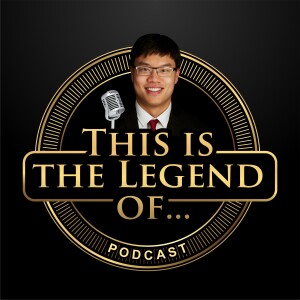
Saturday Sep 28, 2024
Saturday Sep 28, 2024
It's difficult enough to get to therapy. It's even more heartbreaking when you realize that no matter how hard you tried, it didn't work. And it's NOT your fault.
Unfortunately, this is the reality facing many Asians and Asian-Americans. On this sobering episode, Amos Vang and Godwin Chan discuss the difficult reality of the cultural limits of therapy and the clashing of the WEIRD mindset (Western, Educated, Industrial, Rich, and Democratic) with non-WEIRD mindsets. Amos and Godwin also explain in more detail the introvert experience, as well as how extroverts can relate to introverts in a culturally extroverted Western world.
DISCLAIMER: this episode does NOT aim to give any medical advice at all. Nor is it claiming that ALL therapy fails (therapy can work for some people). This episode simply shines light on an important yet socially taboo topic: that therapy is not necessarily for everyone, and that therapy must improve in order to accommodate more people.
Music by: Amos Vang
Website: https://www.thisisthelegendof.com/
LinkedIn: https://www.linkedin.com/company/this-is-the-legend-of/
Instagram: https://www.instagram.com/thisisthelegendof/
YouTube: https://www.youtube.com/@ThisistheLegendOf
Spotify: https://open.spotify.com/show/4f6wBCVf4bHOkf6Gxb4kb7
Amazon: https://www.audible.ca/pd/B0CHXVZDSY?qid=1694649289&sr=1-1&ref_pageloadid=yW4V4kLXM2THpddw&ref=a_search_c3_lProduct_1_1&pf_rd_p=b278ed0a-c3b2-4491-808c-7cb2190a487c&pf_rd_r=4DEBBGB872W8C893VWEB&pageLoadId=IMnSONEv6qRwv8k9&creativeId=0d6f6720-f41c-457e-a42b-8c8dceb62f2c
IHeartRadio: https://www.iheart.com/podcast/269-this-is-the-legend-of-123106291/
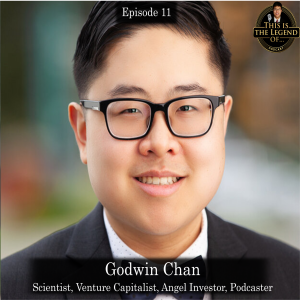
Saturday Aug 31, 2024
Saturday Aug 31, 2024
An episode 20+ years in the making. Scientist, venture capitalist, angel investor, podcaster. This is the Legend Of Godwin Chan. Godwin will also be a regular feature on the podcast and will co-host some episodes.
Amos Vang and Godwin Chan have been friends for over 20 years: since kindergarten/Grade 1! Over these decades, the two friends have had thousands of fascinating conversations about metaphysical philosophy, epistemological philosophy, cultural philosophy, classical musical philosophy, quantum physics, string theory, T-symmetry and the theoretical reversal of time and entropy, evolutionary biology, peak oil, civilizational collapse, causality, T-symmetry, and many other topics.
#philosophy #startup #culture#conversation#legend
Join Amos Vang as he features Godwin’s career and adventures. The conversation gets REALLY good starting at about 57:00 onwards, and it exemplifies their off-camera, off-mic conversations. Such topics include (but are not limited to):
- the limitations of the schooling system,- cultural humility and understanding of Western and non-Western cultures, - introversion vs. extroversion, - Western cultural philosophy vs Chinese cultural philosophy [i.e. Confucianism, Legalism, Taoism, etc.] (and why Chinese culture tends to be a bit better at mediation than Western cultures),- Dunbar’s Number,- Free will vs predeterminism, predeterminism vs. predestination; why free will (arguably) does NOT exist, why predestination (arguably) also does NOT exist, and why predetermination (arguably) exists,- Meaning vs. no meaning, intrinsic meaning vs. the illusion of meaning, Kierkegaardian Existentialism, Camusian Absurdism, Schopenhauerian determinism, heat death of the universe, human extinction, and what that means for a human’s life.
You can follow Godwin on Instagram: https://www.instagram.com/godwinhschan/And you can connect with him on LinkedIn: https://www.linkedin.com/in/godwinhschan/
Music by: Scott Buckley https://www.scottbuckley.com.au/And by Amos Vang
Website: https://www.thisisthelegendof.com/LinkedIn: https://www.linkedin.com/company/this-is-the-legend-of/Instagram: https://www.instagram.com/thisisthelegendof/YouTube: https://www.youtube.com/@ThisistheLegendOfSpotify: https://open.spotify.com/show/4f6wBCVf4bHOkf6Gxb4kb7Amazon: https://www.audible.ca/pd/B0CHXVZDSY?qid=1694649289&sr=1-1&ref_pageloadid=yW4V4kLXM2THpddw&ref=a_search_c3_lProduct_1_1&pf_rd_p=b278ed0a-c3b2-4491-808c-7cb2190a487c&pf_rd_r=4DEBBGB872W8C893VWEB&pageLoadId=IMnSONEv6qRwv8k9&creativeId=0d6f6720-f41c-457e-a42b-8c8dceb62f2cIHeartRadio: https://www.iheart.com/podcast/269-this-is-the-legend-of-123106291/

